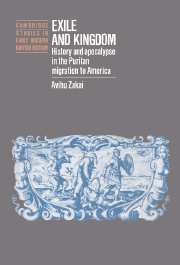Book contents
- Frontmatter
- Contents
- Acknowledgments
- Introduction
- 1 The creation of sacred time
- 2 The creation of sacred space I
- 3 The creation of sacred space II
- 4 The creation of sacred space III
- 5 The creation of sacred errand
- 6 The creation of a sacred Christian society
- 7 The creation of a holy Christian commonwealth
- Index
- Cambridge Studies in Early Modern British History
7 - The creation of a holy Christian commonwealth
Theocracy in New England: the nature and meaning of the holy experiment in the wilderness
Published online by Cambridge University Press: 18 September 2009
- Frontmatter
- Contents
- Acknowledgments
- Introduction
- 1 The creation of sacred time
- 2 The creation of sacred space I
- 3 The creation of sacred space II
- 4 The creation of sacred space III
- 5 The creation of sacred errand
- 6 The creation of a sacred Christian society
- 7 The creation of a holy Christian commonwealth
- Index
- Cambridge Studies in Early Modern British History
Summary
By the side of every religion is to be found a political opinion, which is connected with it by affinity. If the human mind be left to follow its own bent, it will regulate the temporal and spiritual institutions of society in a uniform manner, and man will endeavor, if I may so speak, to harmonize earth with heaven.
Alexis de Tocqueville, Democracy in America, 1835MIGRATION AS AN ACT OF RELIGIOUS REFORMATION
Throughout the 1630s thousands of Puritans crossed the Atlantic to reach New England where they intended to dedicate their lives to God and His word. They came with the belief that the millennium, or the time in which Christ would reign on earth with his saints, as described in the Book of Revelation, was at hand. “If the servants of Christ be not mistaken,” wrote Edward Johnson of his fellow Puritan emigrants' millennial expectations, “the downfall of Antichrist is at hand, and then the Kingdome[s] of the Earth shall become the Kingdome of our Lord Christ.” The realization of their millennial expectations and the transformation of the world into the Kingdom of God, the Puritans believed, depended on the saints assuming an active and decisive role in the apocalyptical events preceding the millennium, as vividly portrayed in Revelation. Thus the saints were to gather themselves into fellowships, or congregations, consisting only of “visible saints.”
- Type
- Chapter
- Information
- Exile and KingdomHistory and Apocalypse in the Puritan Migration to America, pp. 231 - 252Publisher: Cambridge University PressPrint publication year: 1991

